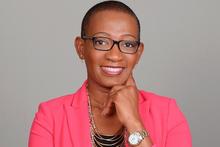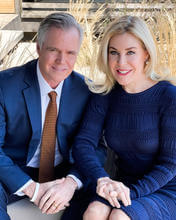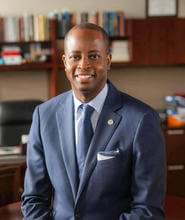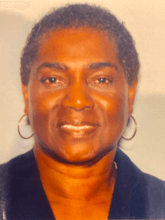History
Forging an environment for gender inclusion requires a vision, and concerted action to translate that vision into reality.
When Howard University opened its doors in 1867, the first five students to be enrolled were daughters of the white professors. In 1884, Mary Ann Shadd Carey made history as the first Black woman to enroll at Howard University. Since then, the number of female students, and women faculty have grown exponentially. Today, women (students, staff, faculty, and alumni) continue to be central to Howard University’s core values of Excellence, Leadership, Truth and Service.
Forging an environment for gender inclusion requires a vision, and concerted action to translate that vision into reality. On November 12, 2020, the announcement of the gift of $1m by Mr. Jim Murren, and Mrs. Heather Hay Murren, fueled aspirations for a strong, gender-focused program and resulted in the creation of the Center for Women, Gender, and Global Leadership at Howard University. The announcement came at an undeniably historic moment, following the election of Howard University alumna, Kamala Harris as the first woman Vice President of the United States of America. Vice President Harris’ election is a testament to Howard University’s pioneering role in producing some of the most iconic Black (women) leaders in the United States and around the world. Through the efforts of faculty, the administration, donors, and partners committed to promoting gender equity and racial justice, the Center will become a global center of excellence, fostering thought-leaders on research, programming and advocacy related to Black women, both nationally, and internationally.
The establishment of the Center for Women, Gender, and Global Leadership at Howard University is made possible by the convergence of institutional leadership open to cultivating a culture of gender equity and inclusion, donors committed to gender and racial justice, and faculty devoted to applied research and social activism. Under the institutional leadership of President Wayne A. I. Frederick, Howard University has progressively addressed issues of gender diversity, equity, and inclusion by increasing the number of women in leadership positions at the university. The Center will continue to build on the rich legacy of Howard University’s women, by promoting leadership, addressing Black women’s issues, and continuously working to create a gender inclusive and equitable society.
Statements from our partners
Founding Director
There is no better time than now to bear witness to the importance of Black women’s leadership displayed every day and everywhere.
As the Founding Director of the Howard University Center for Women, Gender, and Global Leadership, I stand on the legacy of Black women leaders who have been the glue holding together our families, communities, nations, and global systems. I embody the spirit, power, and resilience of African and African American matriarchs, who have individually and collectively, resisted oppression, suppression, and erasure. My existence and positionalities are grounded in the spirit of Ubuntu—“I am, because we are.”
I am humbled by the opportunity at a time such as this, to be the founding director of a Center that emerged at an iconic moment in the history of women’s radical resistance as evidenced by the historic election of Howard University alumna Kamala Harris, a woman of color, as the Vice President Kamala Harris of the United States of America. There is no better time than now to bear witness to the importance of Black women’s leadership displayed everyday and everywhere. Recent victories and portrayals of Black women’s leadership include women’s leadership in the Black Lives Matter movement; the appointment of Dr. Ngozi Okonjo-Iweala as the first woman Director-General of the World Trade Organization; women’s political mobilization during the 2020 presidential elections in the USA, and women’s leadership as frontline workers during the Covid-19 pandemic. These are all testament to the power and resilience of Black women.
As a woman academic, I am inspired by the words of Dr. Kwegyir Aggrey of Ghana, “if you educate a man, you educate an individual, if you educate a woman, you educate a nation.” Women have been pivotal to the development of our societies; yet, they have often received little recognition, and Black women have suffered the brunt of such invisibility for far too long. Whether as educators, or homemakers, Black women, have mothered their families, communities, and nations. And amidst all the challenges, we can say with Maya Angelou, that “still [we] rise.”
The Howard University mission of preparing students to be global leaders, is what inspires me each day in my quest for gender equality, and the respect and dignity of all persons—regardless of any categories or identity that may define them. As a scholar, I am inspired by the amazing talent among our Howard University students reflected in their passion for social justice, and their demonstration of leadership across various sectors.
The Center for Women, Gender, and Global Leadership aspires to become a global center of excellence on matters relating to Black women in the United States, and the African Diaspora. The programming at the Center will be guided by our core values of Resilience, Integrity, Service, and Excellence (R.I.S.E). The Center is a blank canvass— I invite you to be a part of our team as we paint a beautiful portrait of what it means to be Black women leaders.
J. Jarpa Dawuni
Founding Director, CWGGL
Heather and Jim Murren
Over the past century and a half, Howard has produced some of the foremost scholars, physicians, jurists, public servants, writers and artists that have gone on to enlighten and inspire our nation and, indeed, the world. Howard produces more STEM PhDs than any other institution and is the only HBCU with its own hospital. This University has educated more than half of the black doctors, dentists and pharmacists in America.
In other words, one singular institution is largely responsible for the diversification of our nation’s healthcare workforce. Howard is dedicated to improving affordability and access to higher education by creating initiatives to help more students graduate in less than four years thus cutting their costs in debt and accelerating their professional careers. Unsurprisingly, Howard is ranked as one of America’s top universities for social mobility.
Under Dr. Fredrick’s leadership, numerous programs and services have been implemented to focus on our student’s Academic success and the student experience as a whole ultimately leading to increased student retention and higher graduation rates.
Grounded in a historically black university and a preeminent institution of higher education, a Center of Excellence for Women will not only be a place of scholarship and the creation of new knowledge, but also a place to inform, enhance and open career paths for Black women at a critical moment in history. While Black women have always had the highest workforce participation among women, and exceptionally high levels of civic engagement, the barriers to advancement resulting from both systemic racism and sexism has led to these women being overlooked and underutilized in professional fields and leadership roles, causing them significant economic disadvantagement.
While Black women have less than 1% of the wealth held by their single male counterparts, and even less than that held by white women and men. Many households are headed by black women, so this in turn disadvantages families, communities and in turn our country. Studies around the world have repeatedly demonstrated that women headed households spend more on their families than male-headed households—even when the householders are poorer. So, driving these women’s earnings power will drive consumption, which in turn drives economic growth. As a long-time investor I know that the current situation needs to change — in these precarious economic and civic times we cannot afford to not fully deploy every asset towards recovery and resilience, and societal well-being.
We cannot overstate the importance of advancing Black women's leadership at this moment in history. Facing a global pandemic, a severe economic downturn and a renewed societal focus on racial injustice, the country is facing a critical inflection point. To secure our national economy and ensure our future prosperity, we have to promote female leadership and ensure women's equal representation across all sectors of our society. Women already represent a significant and growing proportion of the labor force and a vocal component of civic life. This gift seeks to capture that energy, develop this exceptional talent pool and push our country forward, with women at the helm. Under the transcendent leadership of President Frederick, Howard has become a widely influential institution that is uniquely positioned to develop the next generation of leaders. With Dr. Dawuni's guidance, we will work to bring this Center to life and realize the vision behind it. As lifetime investors of Howard, we know that the returns on this investment will be exceptional for Black women and for our country as a whole as we move past these challenging times.
We hope that this Center of Excellence can be a part of a solution towards fully engaging Black women in our economy through providing Black students with mentor ship, sponsorship opportunities and career pipelines, grounded in excellent research and scholarship.
Heather and Jim Murren
Donors
President Frederick
As the nation’s preeminent historically Black college and university, it is Howard University’s distinct responsibility to press for equality and justice for all people throughout the world. Our advocacy must be both broad and targeted; our motto of Truth and Service calls on Howard to champion the rights due to all people through education and confront entrenched injustices that marginalize swaths of society based on either color or gender. The Center for Women, Gender and Global Leadership is a critical aspect of Howard’s social justice mission.
Thanks to the generous gift from Trustee Jim Murren and Mrs. Heather Hay Murren, Howard was able to create this much-needed space to provide essential support to the numerous challenges women face in their everyday lives. Not only will this center help recognize the vital role women have always played in our society, but it will serve as a critical advocacy hub to generate solutions and press for much-needed change to ensure that women receive equity and fairness, equality and justice.
We need only look to the White House to see an example of the importance of women in our world today. Vice President Kamala Harris is a testament to the significant role women already play in our society as well as to the impact women can have when we insist on cultivating a global society where all people – regardless of their gender – are given an equal opportunity to test the heights of their talents. Through this center, the experience of Howard students will be significantly enriched, and we will empower Black women to continue to take their rightful place as leaders in every facet of our society and the global community.
Wayne A. I. Frederick
President, Howard University
Florence Bonner
Women’s Studies at Howard University: Reflections on my Journey
I arrived at Howard University in Fall of 1992 and assumed the position as Chair of the Sociology and Anthropology Department. Prior to my journey at Howard, I served as the Executive Director of the Center
for Women in Government (CWIG) at the State University of New York-Albany (SUNYA). At the time, the institution was highly regarded for its ground-breaking work towards the advancement of gender equity in the workforce. While at SUNYA, I traveled to DC to involve Howard University women in an initiative funded by the Ford Foundation. During my visit, Dr. Joyce A. Ladner, former Provost for Academic Affairs, suggested that I consider coming to Howard to launch programs to benefit Howard women.
Dr. Ladner said, "…instead of you bringing SUNY money here, you should be here helping to move things."
As we sometimes say, "enough said.”
At the time, education data showed women outpacing males (and Black women far outpacing Black males), but we needed to take notice and ask where and at what level in the academy this occurs. That desire for knowledge led me to heed Dr. Ladner's call to action.
Planning began with excitement from a significant number of supportive colleagues. Both the student body, faculty and staff collaborated to craft a program that would resonate across all disciplines. Since we did not have sufficient funds to design a center, establishing a women's institute presented a feasible opportunity for future growth. Although this fresh idea generated many supporters, it also came with resistance.
Many thought the name African American Women's Institute (AAWI) was exclusionary, but it needed to stand - it was a part of our identity. Women centers all around the country popped up during this time, supported by the Ford Foundation. However, very few collegiate women's centers staffed women of color. Beverly Guy-Sheftall at Spelman College, Dr. Bonnie Dill Thornton at the University of Maryland and I, were a part of a small margin of women of color within the women's center conglomerate.
The next step after naming and defining vision, mission, goals and objectives was to create a framework that consistently engaged students of all backgrounds. As chair of the Sociology and Anthropology Department, I had a platform that provided excellent foundational resources to promote that framework. My team introduced courses that focused on women's issues and roles in society. In addition to introducing new courses, we also expanded our visibility on campus by launching a website and hosting small gatherings on campus. Dr. Ladner's initial $6,000 contribution supported the institute's preliminary work.
In 1997, Dr. Guy-Sheftall introduced me to the Massachusetts Institute of Technology's conference entitled, "Black Women in the Academy: Defending Our Name" held in 1994. The allies I met at this conference were instrumental in helping me launch Black Women in the Academy II at Howard. The conference at Howard University would mark five years after the first meeting was held at the Massachusetts Institute for Technology (MIT), and it would launch the African American Women Institute (AAWI) at Howard.
A small gathering of MIT women met with me led by Dr. Evelynn Hammonds. This led to a discussion that it was a good a good time to launch a Black Women in the Academy II, examining women’s space in the academy nationally and internationally, one that women at HU under the umbrella of the newly formed African American Institute could launch. Black Women in The Academy II was carefully crafted over more than a year’s time. We worked with the MIT women to tap women across the country; but we wanted to engage the HU campus in a broader reach than the MIT women had done. Not only did we want US women, but I also wanted international participation and I wanted a deeper reach for women on our campus; I wanted the arts and professional disciplines, and we did.
I reached out to NSF first for funding. I had worked with colleagues at the foundation for years and they did not disappoint. My next approach was to the Ford Foundation. Again, the response was with enthusiasm and support. The success of the conference was incredible. Women were calling and lobbying to participate. However, at some point we had to finalize the program. So, on June 24,1999 AAWI launched its first major event on an international scale. Three days of plenary sessions, workshops, special sessions, an art exhibition and catalogue, honorary receptions, a book exhibition, and vendors. The Ford Foundation funded all of the international travel and accommodations. NSF funded space and reception, it also provided additional money directly to women from other universities who wanted to bring students.
This ambitious and successful event helped us post conference, to institutionalize some of the work. Following the success of the Black Women in the Academy II, Dr. Carla Brailey suggested a certificate program. So, we set out to create the Graduate Women’s Certificate Program open to all HU graduate students. Men could learn more about the women they studied and worked beside. The Program has been thriving for more than a decade. Dr. Rebecca Reverie and Dr. Anita Nahal drew upon other departments to offer a cluster of courses, all of which contained a feminist theory anchor. Their efforts, along with the generous aid of independent donors, the Ford Foundation, and the National Science Foundation, led to the certificate program's approval.
The Institute and Certificate Program at Howard University are precursors to the Center for Women, Gender and Global Leadership. Now, more than ever, this Center is needed. Unfortunately, the numerous inequities that gave rise to women centers still prevail. Women of color and their communities remain disproportionately impacted economically, politically, and educationally. The Center at Howard will no doubt lead to greater knowledge, advocacy, and positive outcomes for all.
Florence Bonner
Professor Emerita, Department of Sociology, Howard University




